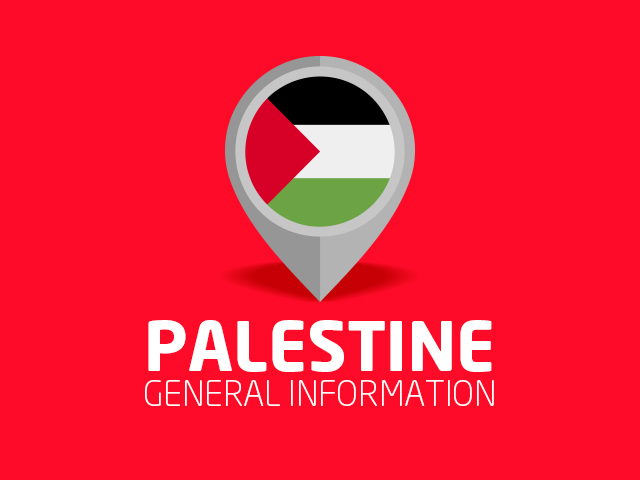› Accommodation
All major Palestinian cities and towns offer a variety of conveniently located places to stay. Christian convents and hospices offer the same facilities and prices as hotels. Bed-and-breakfast options are inexpensive and offer visitors a unique opportunity to become acquainted with Palestinian family life.
› Local cuisine
Palestinian cuisine is very popular among visitors. Diners are offered an appetizing assortment of hors-d’oeuvres, known as mezze. Hummus and baba ghanoush, widely known in Europe and the United States, are made to perfection in Palestine. Main courses include a savory collection of meat, poultry, seafood, and vegetable dishes. Palestine is also renowned for its sweet pastries.
› Handicrafts
Cross-stitch embroidery is a traditional art form in Palestine. Using natural homemade materials, women create intricately embroidered dresses, jackets, vests, cushions, tablecloths, and much more.
Jerusalem pottery is another art in Palestine. It includes ceramics decorated with geometric patterns and colorful glassware.
Religious ornaments, handmade from olive wood and mother-of-pearl with painstaking attention to detail, are also popular. Palestine’s world-renowned olive-wood carvings are made from local olive trees, some of which date back to the time of Jesus. Exquisite olive-wood statues, boxes, crosses, and other items can be found at the numerous souvenir shops in Bethlehem and Jerusalem.
› Climate
There are four seasons in Palestine. Winter is mildly cold and rainy, whereas summer is usually hot and dry. Autumn is pleasant, and spring is beautiful, with a wide array of wild flowers and trees in bloom. Average temperatures in Palestine range from 9 to 18 degrees Celsius in winter and 26 to 30 degrees Celsius in summer. Regardless of the season, visitors are advised to wear modest dress, especially when visiting holy sites.
› Communications
International calls can be made from domestic telephones, including public pay phones. Fax and e-mail services are available.
› Currency
In the absence of a Palestinian monetary unit, the New Israeli Shekel remains in use. All major credit cards and travellers checks are accepted. Foreign currencies can easily be exchanged at any bank or money-exchange office.
› Economy
Palestine has a developing economy in tourism and agriculture, and this generates the country’s main economic income. With seven agro-climatic zones with at least twenty different soils, nearly sixty agricultural crops are grown in Palestine. Industry and trade are still small-scale, largely due to Israeli restrictions.
› Language
Arabic is the official language in Palestine. English is widely spoken and, to a lesser extent, also Italian, French, and German.
› Local time
Palestinian time is GMT + 2 hours in winter and GMT + 3 hours in summer.
› Shopping
Shopping in Palestine is a unique experience, with customers and merchants often good-naturedly haggling over prices. The country’s main streets and markets are filled with shops that sell local and imported items. Especially appealing to tourists are the numerous stores that offer handmade items, aromatic Middle Eastern spices, jewelry, tasty oriental sweets, and much more.
› Working hours
Government offices open from 8:00 am to 3:00 pm. Banks open from 8:00 am to 12:30 pm, with some banks reopening from 3:00 to 5:00 pm. Most shops are open from around 8:00 am until around 7:00 pm. Muslim shops close on Friday, while Christian shops close on Sunday. The official weekend is Friday and Saturday.
› Transportation
Car rental companies in major Palestinian cities offer reasonable prices. Taxis are both comfortable and widely available. However, since taxis don’t operate on meters, it is best to agree on the price before setting off. Economically priced shared taxis are also widely used.


